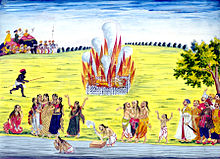Criticism of Hinduism
[citation needed] In particular, Sramanas denied the sruti (divine) nature of the Vedas and opposed sacrificial rituals which were at the heart of Brahminical philosophy at the time.
[2] This period witnessed a flourishing of diverse philosophical schools, including Yoga, Buddhism, Jainism, Ajivikas, and other Sramana traditions that engaged in debates with orthodox Vedic practices.
[6] Sramana traditions, such as Jainism, placed a strong emphasis on non-violence (ahimsa), which stood in contrast to certain Vedic rituals that involved animal sacrifices.
[12] Roshen Dalal postulated that its mention in some of the Puranas indicates that it slowly grew in prevalence from 5th-7th century and later became an accepted custom around 1000 CE among those of higher classes, especially the Rajputs.
[26] The ban was challenged by a petition signed by "several thousand... Hindoo inhabitants of Bihar, Bengal, Orissa etc"[27] and the matter went to the Privy Council in London.
[28] Human Rights Watch describes the caste system as a "discriminatory and cruel, inhuman, and degrading treatment"[29] of over 165 million people in India.
